Tourism Sustainability: EasyJet's Strategies Post-COVID-19 in the UK
VerifiedAdded on 2023/06/10
|10
|2385
|419
Project
AI Summary
This project investigates the strategies employed by the UK tourism industry, focusing on EasyJet, to address the impacts of COVID-19 and ensure future sustainability. It examines the significance of sustainability within the UK tourism sector, the methods used by EasyJet to navigate the challenges posed by the pandemic, and the benefits gained from implementing sustainable business practices. The research uses secondary data and thematic analysis to explore these aspects, highlighting the importance of green practices, renewable energy projects, and customer retention in achieving both environmental and economic sustainability within the tourism industry. The project concludes that embracing sustainability is crucial for travel companies to protect the environment, enhance brand image, and attract customers in the post-COVID-19 era.
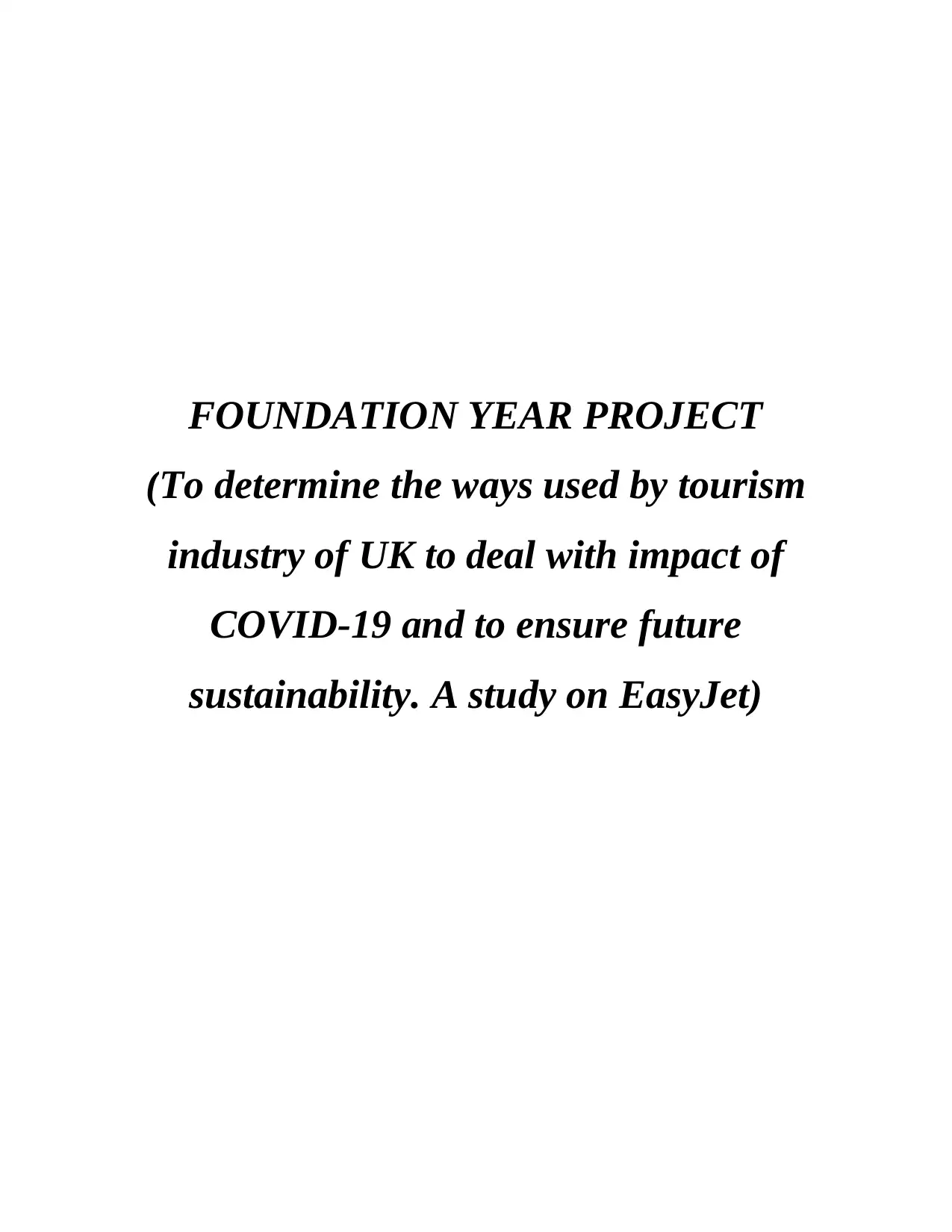
FOUNDATION YEAR PROJECT
(To determine the ways used by tourism
industry of UK to deal with impact of
COVID-19 and to ensure future
sustainability. A study on EasyJet)
(To determine the ways used by tourism
industry of UK to deal with impact of
COVID-19 and to ensure future
sustainability. A study on EasyJet)
Paraphrase This Document
Need a fresh take? Get an instant paraphrase of this document with our AI Paraphraser
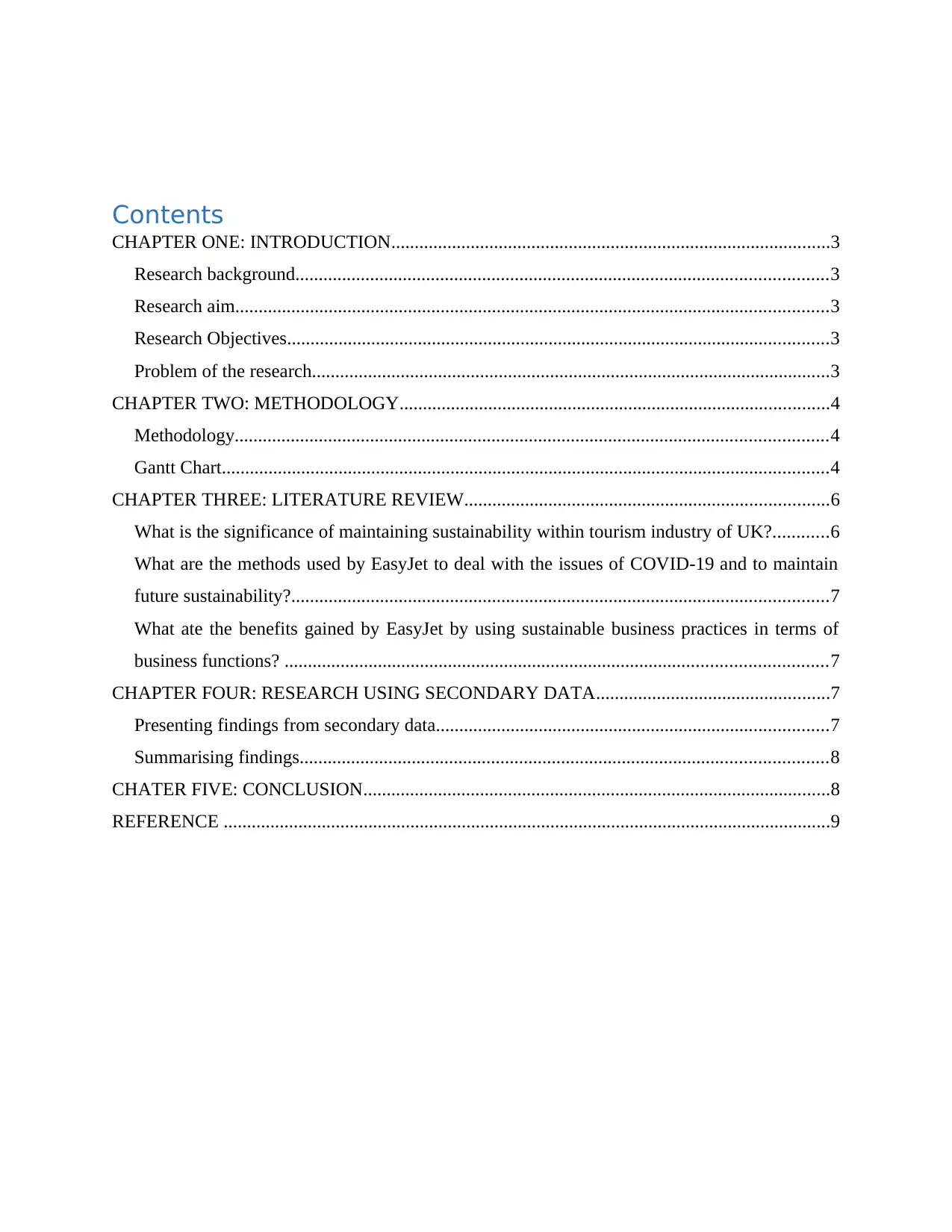
Contents
CHAPTER ONE: INTRODUCTION..............................................................................................3
Research background..................................................................................................................3
Research aim...............................................................................................................................3
Research Objectives....................................................................................................................3
Problem of the research...............................................................................................................3
CHAPTER TWO: METHODOLOGY............................................................................................4
Methodology...............................................................................................................................4
Gantt Chart..................................................................................................................................4
CHAPTER THREE: LITERATURE REVIEW..............................................................................6
What is the significance of maintaining sustainability within tourism industry of UK?............6
What are the methods used by EasyJet to deal with the issues of COVID-19 and to maintain
future sustainability?...................................................................................................................7
What ate the benefits gained by EasyJet by using sustainable business practices in terms of
business functions? ....................................................................................................................7
CHAPTER FOUR: RESEARCH USING SECONDARY DATA..................................................7
Presenting findings from secondary data....................................................................................7
Summarising findings.................................................................................................................8
CHATER FIVE: CONCLUSION....................................................................................................8
REFERENCE ..................................................................................................................................9
CHAPTER ONE: INTRODUCTION..............................................................................................3
Research background..................................................................................................................3
Research aim...............................................................................................................................3
Research Objectives....................................................................................................................3
Problem of the research...............................................................................................................3
CHAPTER TWO: METHODOLOGY............................................................................................4
Methodology...............................................................................................................................4
Gantt Chart..................................................................................................................................4
CHAPTER THREE: LITERATURE REVIEW..............................................................................6
What is the significance of maintaining sustainability within tourism industry of UK?............6
What are the methods used by EasyJet to deal with the issues of COVID-19 and to maintain
future sustainability?...................................................................................................................7
What ate the benefits gained by EasyJet by using sustainable business practices in terms of
business functions? ....................................................................................................................7
CHAPTER FOUR: RESEARCH USING SECONDARY DATA..................................................7
Presenting findings from secondary data....................................................................................7
Summarising findings.................................................................................................................8
CHATER FIVE: CONCLUSION....................................................................................................8
REFERENCE ..................................................................................................................................9
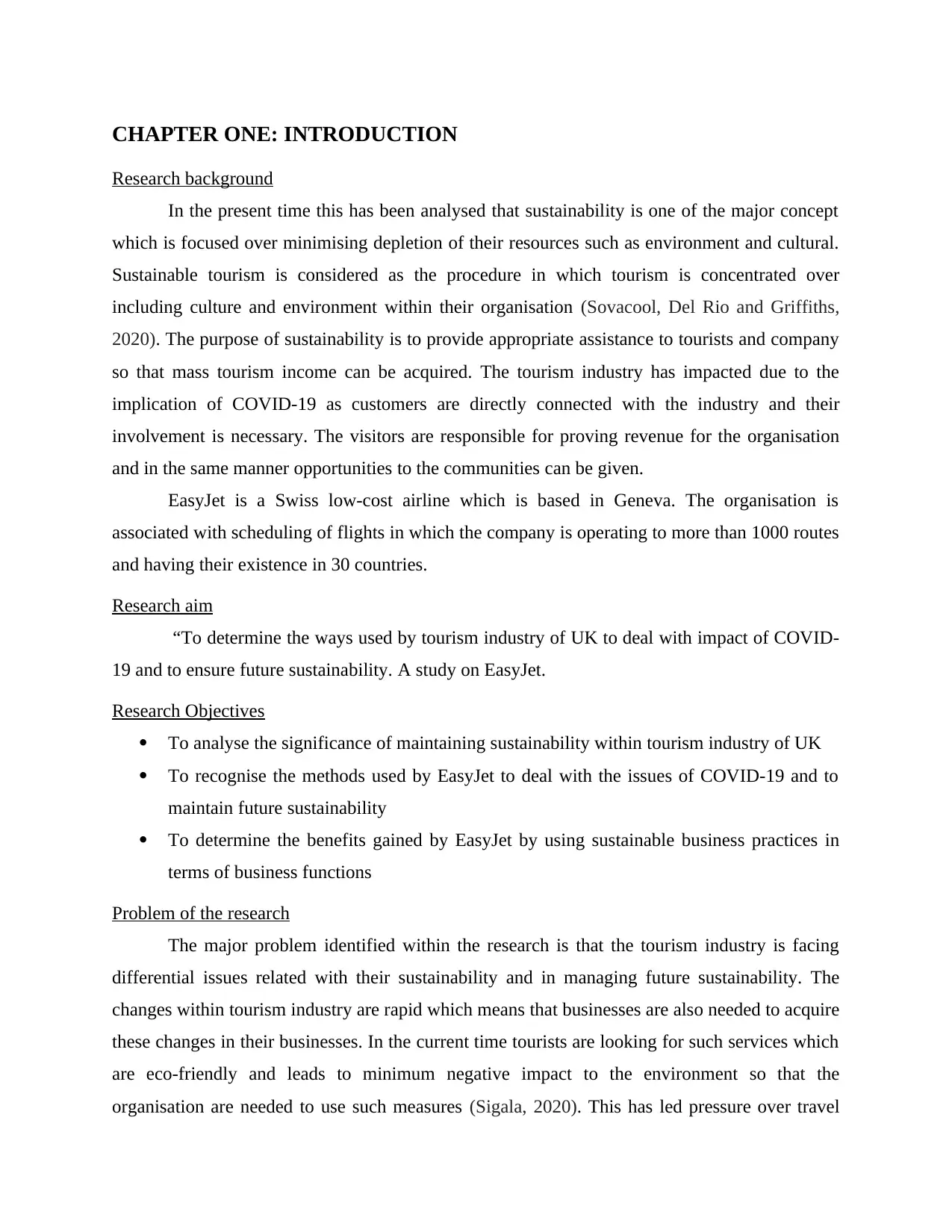
CHAPTER ONE: INTRODUCTION
Research background
In the present time this has been analysed that sustainability is one of the major concept
which is focused over minimising depletion of their resources such as environment and cultural.
Sustainable tourism is considered as the procedure in which tourism is concentrated over
including culture and environment within their organisation (Sovacool, Del Rio and Griffiths,
2020). The purpose of sustainability is to provide appropriate assistance to tourists and company
so that mass tourism income can be acquired. The tourism industry has impacted due to the
implication of COVID-19 as customers are directly connected with the industry and their
involvement is necessary. The visitors are responsible for proving revenue for the organisation
and in the same manner opportunities to the communities can be given.
EasyJet is a Swiss low-cost airline which is based in Geneva. The organisation is
associated with scheduling of flights in which the company is operating to more than 1000 routes
and having their existence in 30 countries.
Research aim
“To determine the ways used by tourism industry of UK to deal with impact of COVID-
19 and to ensure future sustainability. A study on EasyJet.
Research Objectives
To analyse the significance of maintaining sustainability within tourism industry of UK
To recognise the methods used by EasyJet to deal with the issues of COVID-19 and to
maintain future sustainability
To determine the benefits gained by EasyJet by using sustainable business practices in
terms of business functions
Problem of the research
The major problem identified within the research is that the tourism industry is facing
differential issues related with their sustainability and in managing future sustainability. The
changes within tourism industry are rapid which means that businesses are also needed to acquire
these changes in their businesses. In the current time tourists are looking for such services which
are eco-friendly and leads to minimum negative impact to the environment so that the
organisation are needed to use such measures (Sigala, 2020). This has led pressure over travel
Research background
In the present time this has been analysed that sustainability is one of the major concept
which is focused over minimising depletion of their resources such as environment and cultural.
Sustainable tourism is considered as the procedure in which tourism is concentrated over
including culture and environment within their organisation (Sovacool, Del Rio and Griffiths,
2020). The purpose of sustainability is to provide appropriate assistance to tourists and company
so that mass tourism income can be acquired. The tourism industry has impacted due to the
implication of COVID-19 as customers are directly connected with the industry and their
involvement is necessary. The visitors are responsible for proving revenue for the organisation
and in the same manner opportunities to the communities can be given.
EasyJet is a Swiss low-cost airline which is based in Geneva. The organisation is
associated with scheduling of flights in which the company is operating to more than 1000 routes
and having their existence in 30 countries.
Research aim
“To determine the ways used by tourism industry of UK to deal with impact of COVID-
19 and to ensure future sustainability. A study on EasyJet.
Research Objectives
To analyse the significance of maintaining sustainability within tourism industry of UK
To recognise the methods used by EasyJet to deal with the issues of COVID-19 and to
maintain future sustainability
To determine the benefits gained by EasyJet by using sustainable business practices in
terms of business functions
Problem of the research
The major problem identified within the research is that the tourism industry is facing
differential issues related with their sustainability and in managing future sustainability. The
changes within tourism industry are rapid which means that businesses are also needed to acquire
these changes in their businesses. In the current time tourists are looking for such services which
are eco-friendly and leads to minimum negative impact to the environment so that the
organisation are needed to use such measures (Sigala, 2020). This has led pressure over travel
⊘ This is a preview!⊘
Do you want full access?
Subscribe today to unlock all pages.

Trusted by 1+ million students worldwide
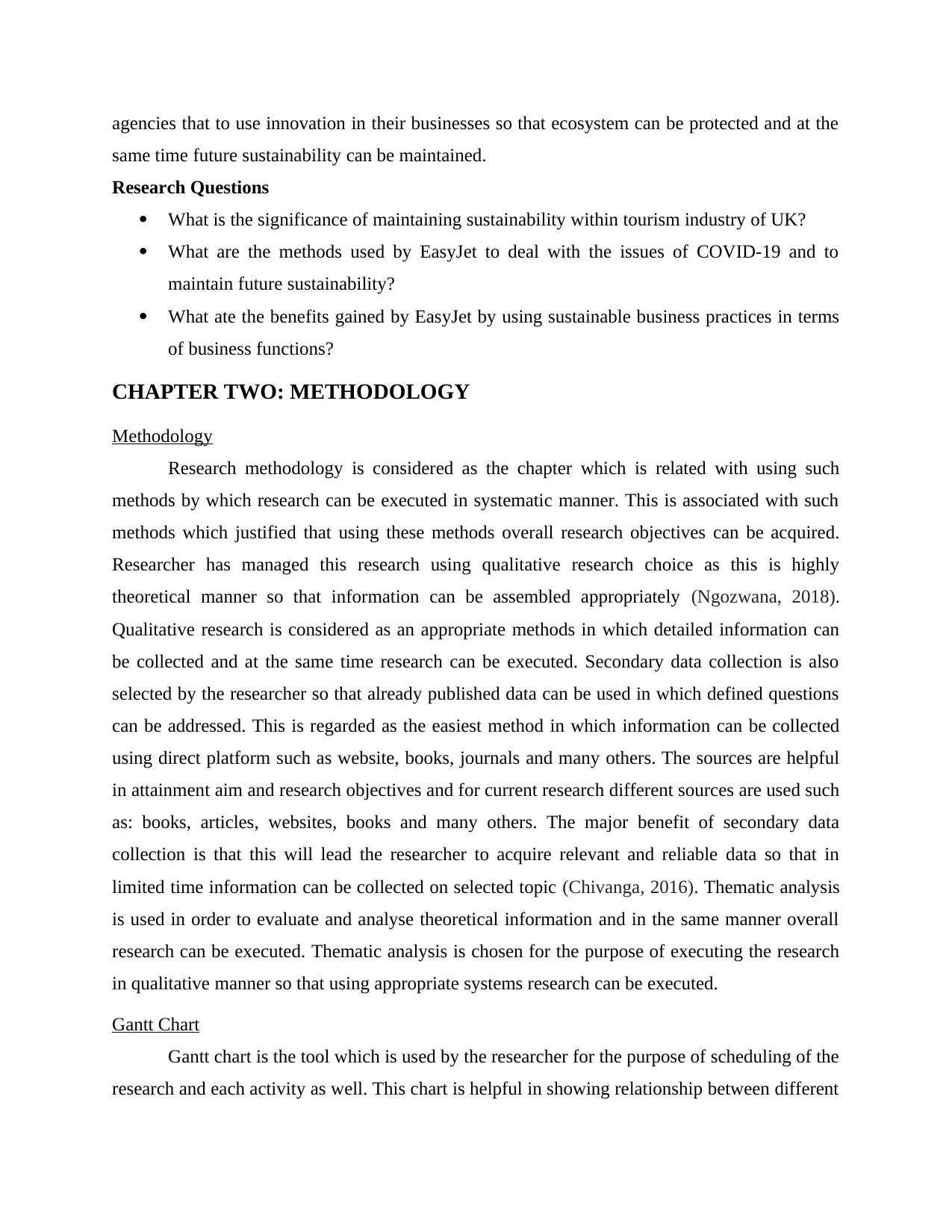
agencies that to use innovation in their businesses so that ecosystem can be protected and at the
same time future sustainability can be maintained.
Research Questions
What is the significance of maintaining sustainability within tourism industry of UK?
What are the methods used by EasyJet to deal with the issues of COVID-19 and to
maintain future sustainability?
What ate the benefits gained by EasyJet by using sustainable business practices in terms
of business functions?
CHAPTER TWO: METHODOLOGY
Methodology
Research methodology is considered as the chapter which is related with using such
methods by which research can be executed in systematic manner. This is associated with such
methods which justified that using these methods overall research objectives can be acquired.
Researcher has managed this research using qualitative research choice as this is highly
theoretical manner so that information can be assembled appropriately (Ngozwana, 2018).
Qualitative research is considered as an appropriate methods in which detailed information can
be collected and at the same time research can be executed. Secondary data collection is also
selected by the researcher so that already published data can be used in which defined questions
can be addressed. This is regarded as the easiest method in which information can be collected
using direct platform such as website, books, journals and many others. The sources are helpful
in attainment aim and research objectives and for current research different sources are used such
as: books, articles, websites, books and many others. The major benefit of secondary data
collection is that this will lead the researcher to acquire relevant and reliable data so that in
limited time information can be collected on selected topic (Chivanga, 2016). Thematic analysis
is used in order to evaluate and analyse theoretical information and in the same manner overall
research can be executed. Thematic analysis is chosen for the purpose of executing the research
in qualitative manner so that using appropriate systems research can be executed.
Gantt Chart
Gantt chart is the tool which is used by the researcher for the purpose of scheduling of the
research and each activity as well. This chart is helpful in showing relationship between different
same time future sustainability can be maintained.
Research Questions
What is the significance of maintaining sustainability within tourism industry of UK?
What are the methods used by EasyJet to deal with the issues of COVID-19 and to
maintain future sustainability?
What ate the benefits gained by EasyJet by using sustainable business practices in terms
of business functions?
CHAPTER TWO: METHODOLOGY
Methodology
Research methodology is considered as the chapter which is related with using such
methods by which research can be executed in systematic manner. This is associated with such
methods which justified that using these methods overall research objectives can be acquired.
Researcher has managed this research using qualitative research choice as this is highly
theoretical manner so that information can be assembled appropriately (Ngozwana, 2018).
Qualitative research is considered as an appropriate methods in which detailed information can
be collected and at the same time research can be executed. Secondary data collection is also
selected by the researcher so that already published data can be used in which defined questions
can be addressed. This is regarded as the easiest method in which information can be collected
using direct platform such as website, books, journals and many others. The sources are helpful
in attainment aim and research objectives and for current research different sources are used such
as: books, articles, websites, books and many others. The major benefit of secondary data
collection is that this will lead the researcher to acquire relevant and reliable data so that in
limited time information can be collected on selected topic (Chivanga, 2016). Thematic analysis
is used in order to evaluate and analyse theoretical information and in the same manner overall
research can be executed. Thematic analysis is chosen for the purpose of executing the research
in qualitative manner so that using appropriate systems research can be executed.
Gantt Chart
Gantt chart is the tool which is used by the researcher for the purpose of scheduling of the
research and each activity as well. This chart is helpful in showing relationship between different
Paraphrase This Document
Need a fresh take? Get an instant paraphrase of this document with our AI Paraphraser
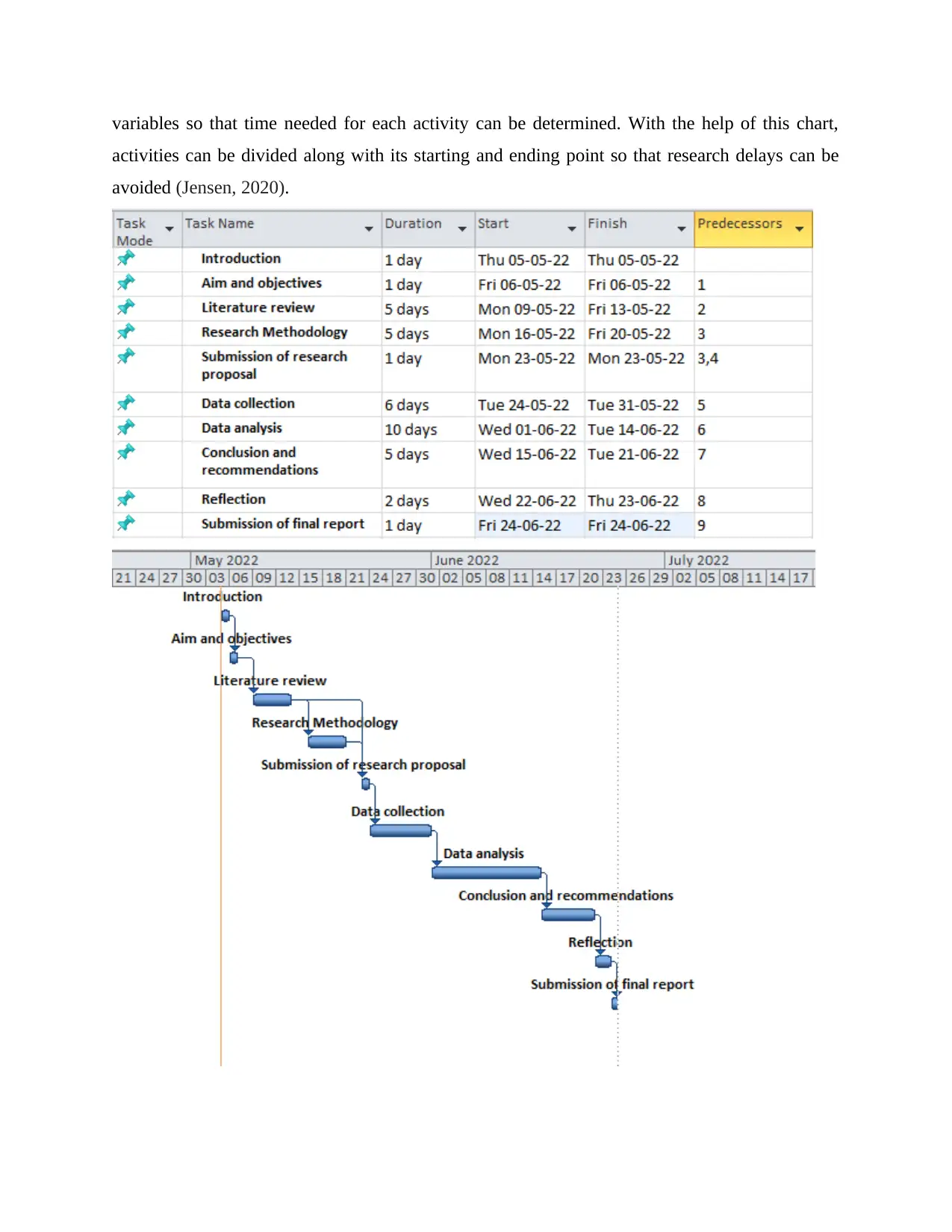
variables so that time needed for each activity can be determined. With the help of this chart,
activities can be divided along with its starting and ending point so that research delays can be
avoided (Jensen, 2020).
activities can be divided along with its starting and ending point so that research delays can be
avoided (Jensen, 2020).
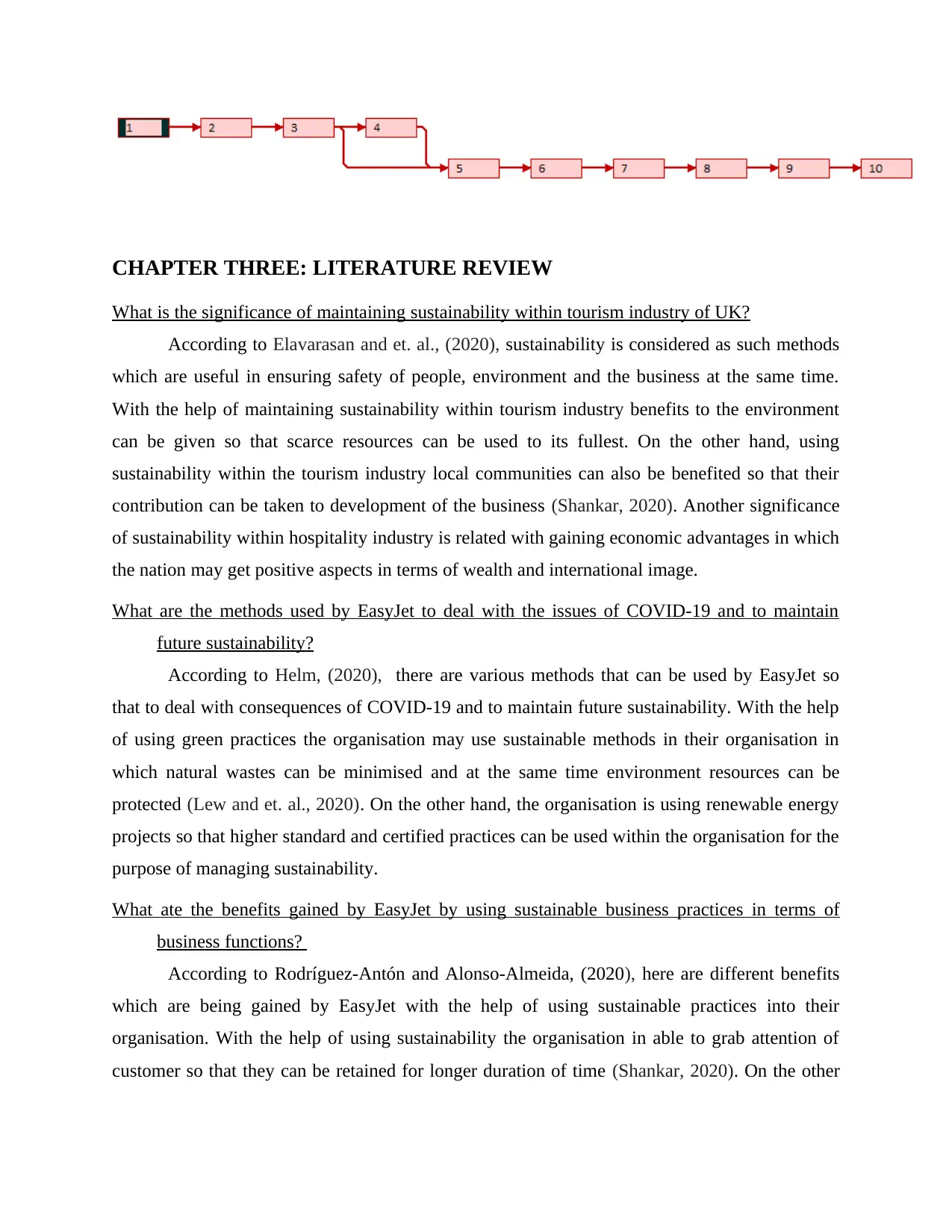
CHAPTER THREE: LITERATURE REVIEW
What is the significance of maintaining sustainability within tourism industry of UK?
According to Elavarasan and et. al., (2020), sustainability is considered as such methods
which are useful in ensuring safety of people, environment and the business at the same time.
With the help of maintaining sustainability within tourism industry benefits to the environment
can be given so that scarce resources can be used to its fullest. On the other hand, using
sustainability within the tourism industry local communities can also be benefited so that their
contribution can be taken to development of the business (Shankar, 2020). Another significance
of sustainability within hospitality industry is related with gaining economic advantages in which
the nation may get positive aspects in terms of wealth and international image.
What are the methods used by EasyJet to deal with the issues of COVID-19 and to maintain
future sustainability?
According to Helm, (2020), there are various methods that can be used by EasyJet so
that to deal with consequences of COVID-19 and to maintain future sustainability. With the help
of using green practices the organisation may use sustainable methods in their organisation in
which natural wastes can be minimised and at the same time environment resources can be
protected (Lew and et. al., 2020). On the other hand, the organisation is using renewable energy
projects so that higher standard and certified practices can be used within the organisation for the
purpose of managing sustainability.
What ate the benefits gained by EasyJet by using sustainable business practices in terms of
business functions?
According to Rodríguez-Antón and Alonso-Almeida, (2020), here are different benefits
which are being gained by EasyJet with the help of using sustainable practices into their
organisation. With the help of using sustainability the organisation in able to grab attention of
customer so that they can be retained for longer duration of time (Shankar, 2020). On the other
What is the significance of maintaining sustainability within tourism industry of UK?
According to Elavarasan and et. al., (2020), sustainability is considered as such methods
which are useful in ensuring safety of people, environment and the business at the same time.
With the help of maintaining sustainability within tourism industry benefits to the environment
can be given so that scarce resources can be used to its fullest. On the other hand, using
sustainability within the tourism industry local communities can also be benefited so that their
contribution can be taken to development of the business (Shankar, 2020). Another significance
of sustainability within hospitality industry is related with gaining economic advantages in which
the nation may get positive aspects in terms of wealth and international image.
What are the methods used by EasyJet to deal with the issues of COVID-19 and to maintain
future sustainability?
According to Helm, (2020), there are various methods that can be used by EasyJet so
that to deal with consequences of COVID-19 and to maintain future sustainability. With the help
of using green practices the organisation may use sustainable methods in their organisation in
which natural wastes can be minimised and at the same time environment resources can be
protected (Lew and et. al., 2020). On the other hand, the organisation is using renewable energy
projects so that higher standard and certified practices can be used within the organisation for the
purpose of managing sustainability.
What ate the benefits gained by EasyJet by using sustainable business practices in terms of
business functions?
According to Rodríguez-Antón and Alonso-Almeida, (2020), here are different benefits
which are being gained by EasyJet with the help of using sustainable practices into their
organisation. With the help of using sustainability the organisation in able to grab attention of
customer so that they can be retained for longer duration of time (Shankar, 2020). On the other
⊘ This is a preview!⊘
Do you want full access?
Subscribe today to unlock all pages.

Trusted by 1+ million students worldwide
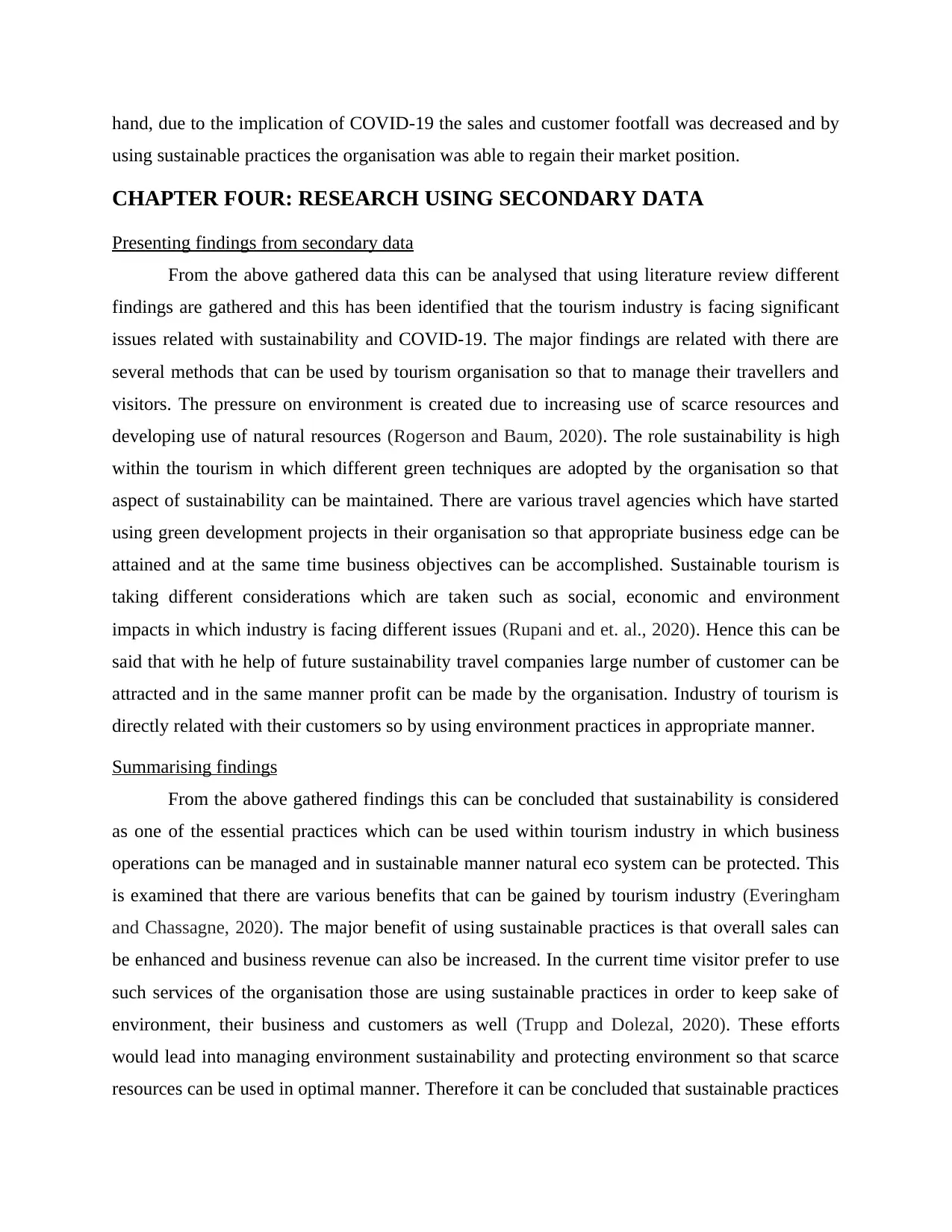
hand, due to the implication of COVID-19 the sales and customer footfall was decreased and by
using sustainable practices the organisation was able to regain their market position.
CHAPTER FOUR: RESEARCH USING SECONDARY DATA
Presenting findings from secondary data
From the above gathered data this can be analysed that using literature review different
findings are gathered and this has been identified that the tourism industry is facing significant
issues related with sustainability and COVID-19. The major findings are related with there are
several methods that can be used by tourism organisation so that to manage their travellers and
visitors. The pressure on environment is created due to increasing use of scarce resources and
developing use of natural resources (Rogerson and Baum, 2020). The role sustainability is high
within the tourism in which different green techniques are adopted by the organisation so that
aspect of sustainability can be maintained. There are various travel agencies which have started
using green development projects in their organisation so that appropriate business edge can be
attained and at the same time business objectives can be accomplished. Sustainable tourism is
taking different considerations which are taken such as social, economic and environment
impacts in which industry is facing different issues (Rupani and et. al., 2020). Hence this can be
said that with he help of future sustainability travel companies large number of customer can be
attracted and in the same manner profit can be made by the organisation. Industry of tourism is
directly related with their customers so by using environment practices in appropriate manner.
Summarising findings
From the above gathered findings this can be concluded that sustainability is considered
as one of the essential practices which can be used within tourism industry in which business
operations can be managed and in sustainable manner natural eco system can be protected. This
is examined that there are various benefits that can be gained by tourism industry (Everingham
and Chassagne, 2020). The major benefit of using sustainable practices is that overall sales can
be enhanced and business revenue can also be increased. In the current time visitor prefer to use
such services of the organisation those are using sustainable practices in order to keep sake of
environment, their business and customers as well (Trupp and Dolezal, 2020). These efforts
would lead into managing environment sustainability and protecting environment so that scarce
resources can be used in optimal manner. Therefore it can be concluded that sustainable practices
using sustainable practices the organisation was able to regain their market position.
CHAPTER FOUR: RESEARCH USING SECONDARY DATA
Presenting findings from secondary data
From the above gathered data this can be analysed that using literature review different
findings are gathered and this has been identified that the tourism industry is facing significant
issues related with sustainability and COVID-19. The major findings are related with there are
several methods that can be used by tourism organisation so that to manage their travellers and
visitors. The pressure on environment is created due to increasing use of scarce resources and
developing use of natural resources (Rogerson and Baum, 2020). The role sustainability is high
within the tourism in which different green techniques are adopted by the organisation so that
aspect of sustainability can be maintained. There are various travel agencies which have started
using green development projects in their organisation so that appropriate business edge can be
attained and at the same time business objectives can be accomplished. Sustainable tourism is
taking different considerations which are taken such as social, economic and environment
impacts in which industry is facing different issues (Rupani and et. al., 2020). Hence this can be
said that with he help of future sustainability travel companies large number of customer can be
attracted and in the same manner profit can be made by the organisation. Industry of tourism is
directly related with their customers so by using environment practices in appropriate manner.
Summarising findings
From the above gathered findings this can be concluded that sustainability is considered
as one of the essential practices which can be used within tourism industry in which business
operations can be managed and in sustainable manner natural eco system can be protected. This
is examined that there are various benefits that can be gained by tourism industry (Everingham
and Chassagne, 2020). The major benefit of using sustainable practices is that overall sales can
be enhanced and business revenue can also be increased. In the current time visitor prefer to use
such services of the organisation those are using sustainable practices in order to keep sake of
environment, their business and customers as well (Trupp and Dolezal, 2020). These efforts
would lead into managing environment sustainability and protecting environment so that scarce
resources can be used in optimal manner. Therefore it can be concluded that sustainable practices
Paraphrase This Document
Need a fresh take? Get an instant paraphrase of this document with our AI Paraphraser
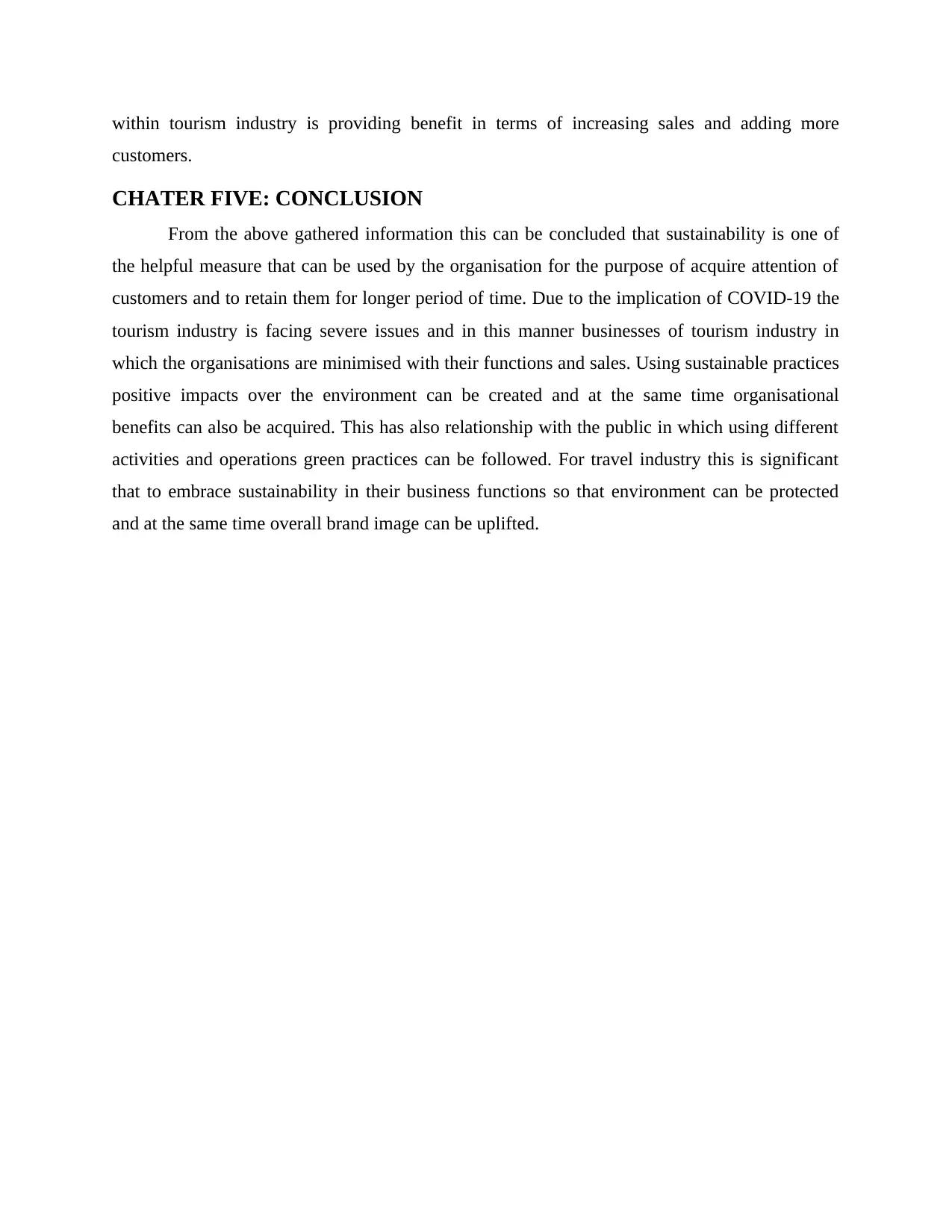
within tourism industry is providing benefit in terms of increasing sales and adding more
customers.
CHATER FIVE: CONCLUSION
From the above gathered information this can be concluded that sustainability is one of
the helpful measure that can be used by the organisation for the purpose of acquire attention of
customers and to retain them for longer period of time. Due to the implication of COVID-19 the
tourism industry is facing severe issues and in this manner businesses of tourism industry in
which the organisations are minimised with their functions and sales. Using sustainable practices
positive impacts over the environment can be created and at the same time organisational
benefits can also be acquired. This has also relationship with the public in which using different
activities and operations green practices can be followed. For travel industry this is significant
that to embrace sustainability in their business functions so that environment can be protected
and at the same time overall brand image can be uplifted.
customers.
CHATER FIVE: CONCLUSION
From the above gathered information this can be concluded that sustainability is one of
the helpful measure that can be used by the organisation for the purpose of acquire attention of
customers and to retain them for longer period of time. Due to the implication of COVID-19 the
tourism industry is facing severe issues and in this manner businesses of tourism industry in
which the organisations are minimised with their functions and sales. Using sustainable practices
positive impacts over the environment can be created and at the same time organisational
benefits can also be acquired. This has also relationship with the public in which using different
activities and operations green practices can be followed. For travel industry this is significant
that to embrace sustainability in their business functions so that environment can be protected
and at the same time overall brand image can be uplifted.
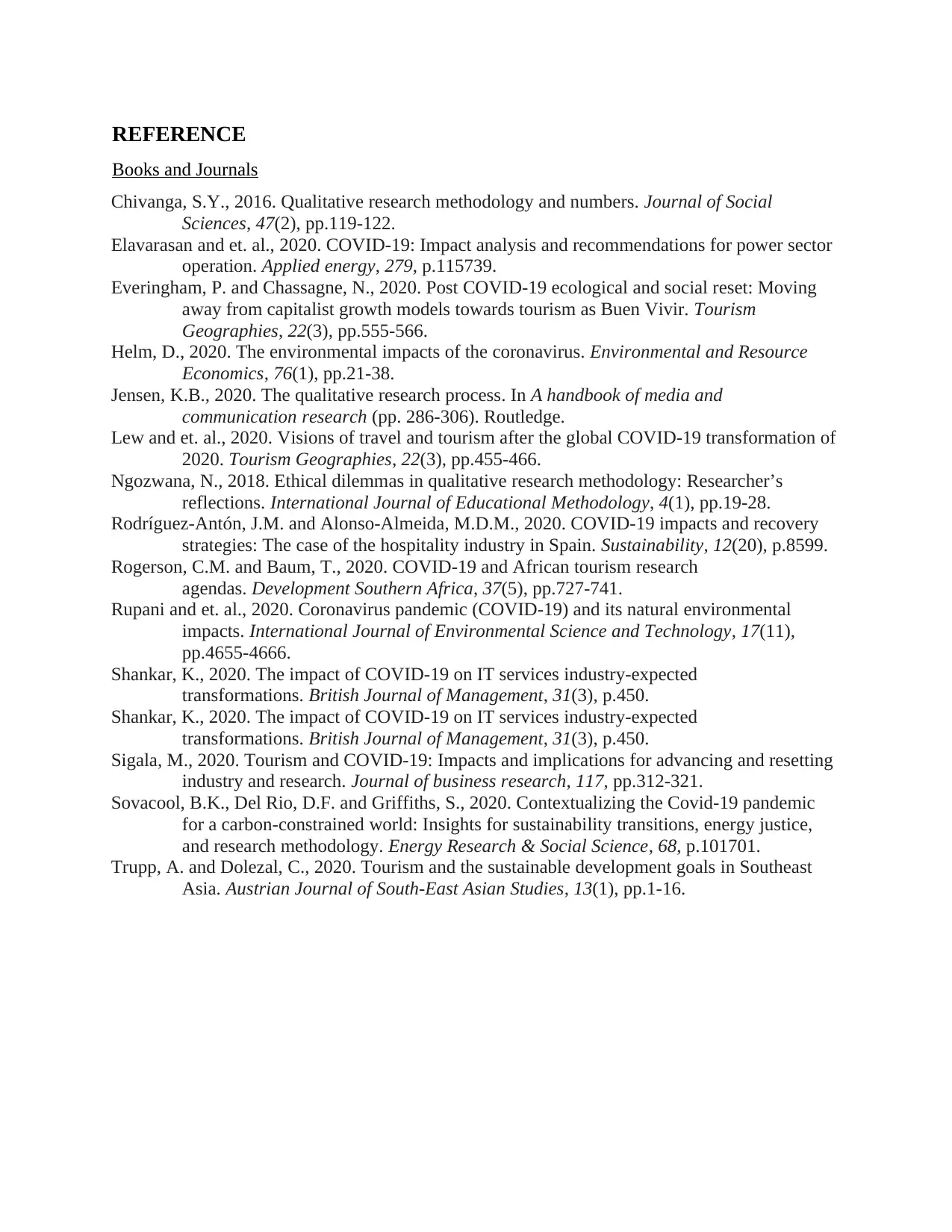
REFERENCE
Books and Journals
Chivanga, S.Y., 2016. Qualitative research methodology and numbers. Journal of Social
Sciences, 47(2), pp.119-122.
Elavarasan and et. al., 2020. COVID-19: Impact analysis and recommendations for power sector
operation. Applied energy, 279, p.115739.
Everingham, P. and Chassagne, N., 2020. Post COVID-19 ecological and social reset: Moving
away from capitalist growth models towards tourism as Buen Vivir. Tourism
Geographies, 22(3), pp.555-566.
Helm, D., 2020. The environmental impacts of the coronavirus. Environmental and Resource
Economics, 76(1), pp.21-38.
Jensen, K.B., 2020. The qualitative research process. In A handbook of media and
communication research (pp. 286-306). Routledge.
Lew and et. al., 2020. Visions of travel and tourism after the global COVID-19 transformation of
2020. Tourism Geographies, 22(3), pp.455-466.
Ngozwana, N., 2018. Ethical dilemmas in qualitative research methodology: Researcher’s
reflections. International Journal of Educational Methodology, 4(1), pp.19-28.
Rodríguez-Antón, J.M. and Alonso-Almeida, M.D.M., 2020. COVID-19 impacts and recovery
strategies: The case of the hospitality industry in Spain. Sustainability, 12(20), p.8599.
Rogerson, C.M. and Baum, T., 2020. COVID-19 and African tourism research
agendas. Development Southern Africa, 37(5), pp.727-741.
Rupani and et. al., 2020. Coronavirus pandemic (COVID-19) and its natural environmental
impacts. International Journal of Environmental Science and Technology, 17(11),
pp.4655-4666.
Shankar, K., 2020. The impact of COVID‐19 on IT services industry‐expected
transformations. British Journal of Management, 31(3), p.450.
Shankar, K., 2020. The impact of COVID‐19 on IT services industry‐expected
transformations. British Journal of Management, 31(3), p.450.
Sigala, M., 2020. Tourism and COVID-19: Impacts and implications for advancing and resetting
industry and research. Journal of business research, 117, pp.312-321.
Sovacool, B.K., Del Rio, D.F. and Griffiths, S., 2020. Contextualizing the Covid-19 pandemic
for a carbon-constrained world: Insights for sustainability transitions, energy justice,
and research methodology. Energy Research & Social Science, 68, p.101701.
Trupp, A. and Dolezal, C., 2020. Tourism and the sustainable development goals in Southeast
Asia. Austrian Journal of South-East Asian Studies, 13(1), pp.1-16.
Books and Journals
Chivanga, S.Y., 2016. Qualitative research methodology and numbers. Journal of Social
Sciences, 47(2), pp.119-122.
Elavarasan and et. al., 2020. COVID-19: Impact analysis and recommendations for power sector
operation. Applied energy, 279, p.115739.
Everingham, P. and Chassagne, N., 2020. Post COVID-19 ecological and social reset: Moving
away from capitalist growth models towards tourism as Buen Vivir. Tourism
Geographies, 22(3), pp.555-566.
Helm, D., 2020. The environmental impacts of the coronavirus. Environmental and Resource
Economics, 76(1), pp.21-38.
Jensen, K.B., 2020. The qualitative research process. In A handbook of media and
communication research (pp. 286-306). Routledge.
Lew and et. al., 2020. Visions of travel and tourism after the global COVID-19 transformation of
2020. Tourism Geographies, 22(3), pp.455-466.
Ngozwana, N., 2018. Ethical dilemmas in qualitative research methodology: Researcher’s
reflections. International Journal of Educational Methodology, 4(1), pp.19-28.
Rodríguez-Antón, J.M. and Alonso-Almeida, M.D.M., 2020. COVID-19 impacts and recovery
strategies: The case of the hospitality industry in Spain. Sustainability, 12(20), p.8599.
Rogerson, C.M. and Baum, T., 2020. COVID-19 and African tourism research
agendas. Development Southern Africa, 37(5), pp.727-741.
Rupani and et. al., 2020. Coronavirus pandemic (COVID-19) and its natural environmental
impacts. International Journal of Environmental Science and Technology, 17(11),
pp.4655-4666.
Shankar, K., 2020. The impact of COVID‐19 on IT services industry‐expected
transformations. British Journal of Management, 31(3), p.450.
Shankar, K., 2020. The impact of COVID‐19 on IT services industry‐expected
transformations. British Journal of Management, 31(3), p.450.
Sigala, M., 2020. Tourism and COVID-19: Impacts and implications for advancing and resetting
industry and research. Journal of business research, 117, pp.312-321.
Sovacool, B.K., Del Rio, D.F. and Griffiths, S., 2020. Contextualizing the Covid-19 pandemic
for a carbon-constrained world: Insights for sustainability transitions, energy justice,
and research methodology. Energy Research & Social Science, 68, p.101701.
Trupp, A. and Dolezal, C., 2020. Tourism and the sustainable development goals in Southeast
Asia. Austrian Journal of South-East Asian Studies, 13(1), pp.1-16.
⊘ This is a preview!⊘
Do you want full access?
Subscribe today to unlock all pages.

Trusted by 1+ million students worldwide

1 out of 10
Related Documents
Your All-in-One AI-Powered Toolkit for Academic Success.
+13062052269
info@desklib.com
Available 24*7 on WhatsApp / Email
![[object Object]](/_next/static/media/star-bottom.7253800d.svg)
Unlock your academic potential
Copyright © 2020–2026 A2Z Services. All Rights Reserved. Developed and managed by ZUCOL.





